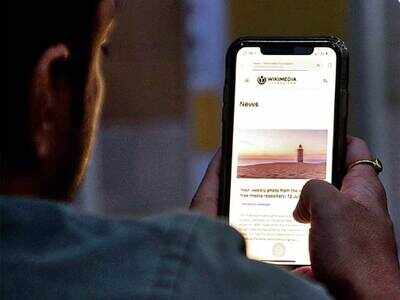It's a curtain call for Wikimedia India... Chapter

Wikimedia India Chapter
In a culmination of a decade-long tussle with its parent body, Wikimedia India Chapter is all set to be shut down or rather derecognised from September 14. This is the decision of the Wikimedia Foundation that has been conveyed to Indian volunteering community late last month. They’ve said that the community’s inability to fall in line with the foundation’s requirements and the lack of leadership as the grounds for snapping the ties. Evidently upset, the community members protested that they were not taken into confidence on this and sought a public hearing to address the issue.
Wikimedia India Chapter, with 1,000 members on board, is a non-profit independent body which aims to support and promote free and open educational content, including the ability to access, develop and contribute to encyclopedias, dictionaries, books and images.
Wikimedia Foundation hostsWikipedia and other initiatives that promote free knowledge and content. Members of the community shared that trouble started with Wikimedia seeking to pump one-sixth of the donations it gets into India.
But clearly the Foundation’s ambitions were larger. In 2010 it opened an India office in New Delhi to take care of its outreach initiative, legalities and technical support among other things.
This created a lot of heartburns within the existing community that felt that its work was being replicated. The community made its displeasure known leading up to the closure of the office in 2012.
Next came the Centre for Internet Studies set up in Bengaluru in 2013-14. The centre being a non-volunteering body could draw the funds Wikimedia wanted to send for expansion of its programme in the country. Community members on condition of anonymity contend that this body flushed with funds started dominating the scene and also began lauding over the community, evoking resentment from the volunteers. "Wikipedia is a non-profit venture and the volunteers edit without remuneration, their work is reflected onGoogle search," said one of the board members.
But the final nail in the coffin was the collaboration with Google's parent company Alphabet Inc, which offered $2 million to Wikimedia Foundation to work on 12 Indic languages, starting with Hindi, as a pilot project to empower editors and promote knowledge on the web. Wikimedia Foundation chose to ignore the volunteering community and outsource the job, with Google throwing its weight behind machine-driven translation tools to create the vernacular content. "Research shows that translations produced so are not quality content and they do not match human intelligence. Our community members voiced these concerns openly on Wikipedia," another member pointed out.
The discontent poured out into thepublic domain discussion forums and was also escalated to global office-bearers of Wikimedia, subsequent to which the community was served notice a fortnight ago. The notice also stated that the Indian volunteering community members could continue to contribute to the encyclopedia at individual levels but the community as a whole would no longer be recognised as a foundation.
Reacting to the notice, Abhinav Srivastava, one of the seven board members of the India Chapter, questioned the decision on the public mailing list of Wikimedia Foundation. Underscoring that he saw no qualitative reason for dismissing the community. Drawing attention to the issue of routing Wikimedia Foundation's funds to the community, he pointed out there are 13,000 in India facing the heat of FCRA and a way around it could have been worked on. Again underscoring that despite Wikimedia being an open source democratic platform it has not considered the view of its community members and sought a public hearing to address the issue.
Responding an email query, Samantha Lien, communications manager at Wikimedia Foundation, noted, "Wikipedia and the other Wikimedia projects are supported by a network of more than 200,000 individual volunteers, groups, and organisations around the world. Together, they collaboratively enrich, grow, and advance the Wikimedia projects and free knowledge mission."
"Since 2015 there have been multiple notices and attempts to bring Wikimedia India's activities in line with chapter requirements. Unfortunately, they did not meet the necessary criteria and the Affiliations Committee was given no other choice but to de-recognise the chapter, which will take effect on September 14, 2019," Lien said.
Replying to the issue of volunteers not feeling included, Lien said, "As standard practice, reporting and discussion with the chapter is private, while the chapter's leadership is encouraged to initiate relevant communications with their membership and communities. This allows the committee to develop a plan with the affiliate before communicating broad changes to the local and global community of volunteers."
Wikimedia currently supports eight Indic language community user groups who lead meet-ups, contests, and other local events including Punjabi Wikimedians, Hindi Wikimedians User Group, Odia Wikimedians User Group, Wikimedians of Kerala User Group, Marathi Wikimedians User Group, Karavali Wikimedians User Group, West Bengal Wikimedians User Group and the Wikimedians of India technical user group.
The senior community members, however, said that other smaller Indian languages would become orphan. "Languages like Konkani, Gujarati, Assamese may disappear as the foundation has not stated what would be the fate of these initiatives," said one of the community member.
Wikimedia India Chapter, with 1,000 members on board, is a non-profit independent body which aims to support and promote free and open educational content, including the ability to access, develop and contribute to encyclopedias, dictionaries, books and images.
Wikimedia Foundation hosts
However, the country’s Foreign Currency Regulation Act (FCRA), 2010, proved to be a stumbling block in routing this money to the volunteering body. While the community members say they were not bothered by the funds issue as they were pitching in voluntarily when required.
But clearly the Foundation’s ambitions were larger. In 2010 it opened an India office in New Delhi to take care of its outreach initiative, legalities and technical support among other things.
This created a lot of heartburns within the existing community that felt that its work was being replicated. The community made its displeasure known leading up to the closure of the office in 2012.
Next came the Centre for Internet Studies set up in Bengaluru in 2013-14. The centre being a non-volunteering body could draw the funds Wikimedia wanted to send for expansion of its programme in the country. Community members on condition of anonymity contend that this body flushed with funds started dominating the scene and also began lauding over the community, evoking resentment from the volunteers. "Wikipedia is a non-profit venture and the volunteers edit without remuneration, their work is reflected on
But the final nail in the coffin was the collaboration with Google's parent company Alphabet Inc, which offered $2 million to Wikimedia Foundation to work on 12 Indic languages, starting with Hindi, as a pilot project to empower editors and promote knowledge on the web. Wikimedia Foundation chose to ignore the volunteering community and outsource the job, with Google throwing its weight behind machine-driven translation tools to create the vernacular content. "Research shows that translations produced so are not quality content and they do not match human intelligence. Our community members voiced these concerns openly on Wikipedia," another member pointed out.
The discontent poured out into the
Reacting to the notice, Abhinav Srivastava, one of the seven board members of the India Chapter, questioned the decision on the public mailing list of Wikimedia Foundation. Underscoring that he saw no qualitative reason for dismissing the community. Drawing attention to the issue of routing Wikimedia Foundation's funds to the community, he pointed out there are 13,000 in India facing the heat of FCRA and a way around it could have been worked on. Again underscoring that despite Wikimedia being an open source democratic platform it has not considered the view of its community members and sought a public hearing to address the issue.
Responding an email query, Samantha Lien, communications manager at Wikimedia Foundation, noted, "Wikipedia and the other Wikimedia projects are supported by a network of more than 200,000 individual volunteers, groups, and organisations around the world. Together, they collaboratively enrich, grow, and advance the Wikimedia projects and free knowledge mission."
"Since 2015 there have been multiple notices and attempts to bring Wikimedia India's activities in line with chapter requirements. Unfortunately, they did not meet the necessary criteria and the Affiliations Committee was given no other choice but to de-recognise the chapter, which will take effect on September 14, 2019," Lien said.
Replying to the issue of volunteers not feeling included, Lien said, "As standard practice, reporting and discussion with the chapter is private, while the chapter's leadership is encouraged to initiate relevant communications with their membership and communities. This allows the committee to develop a plan with the affiliate before communicating broad changes to the local and global community of volunteers."
Wikimedia currently supports eight Indic language community user groups who lead meet-ups, contests, and other local events including Punjabi Wikimedians, Hindi Wikimedians User Group, Odia Wikimedians User Group, Wikimedians of Kerala User Group, Marathi Wikimedians User Group, Karavali Wikimedians User Group, West Bengal Wikimedians User Group and the Wikimedians of India technical user group.
The senior community members, however, said that other smaller Indian languages would become orphan. "Languages like Konkani, Gujarati, Assamese may disappear as the foundation has not stated what would be the fate of these initiatives," said one of the community member.
GALLERIES View more photos









































Recent Messages ()
Please rate before posting your Review
SIGN IN WITH
Refrain from posting comments that are obscene, defamatory or inflammatory, and do not indulge in personal attacks, name calling or inciting hatred against any community. Help us delete comments that do not follow these guidelines by marking them offensive. Let's work together to keep the conversation civil.